Danny, Caroline & Tracy take us on a trip down into the IDS basement…
Continue readingLegacy collection
Documents in the Legacy Collection
By Chloe Dobson
The largest part of the Legacy Collection will be the 20237 documents we have accumulated since the opening of the University.
Official Publications used to have its own dedicated area in the University Library, with a counter service to help users retrieve and discover new items and dedicated staff to develop and manage the collections.
The Documents Librarian, who had a responsibility for the Social Sciences and Parliamentary materials was keen to fill the shelves with pamphlets, reports, ephemora and papers relating to current issues at the time as well as reflecting the research interests of the new University. The building had no space limits and a healthy budget for acquisitions, so many donations were accepted, standing orders established and staff would even travel around collecting new materials.
“I wanted our Library collections to reflect the mood of the times, and this directed me to the ephemeral publications of the interest groups and pressure groups that were active in those decades. We aimed to collect together the output of such organisations, that represented the current social and political views of the decades. Some publications were standing orders from “regular” sources, political parties, research organisations, etc. Many of the pamphlets we collected were the result of scanning the press and being alert to media reports. Those four little words, “a report out today” were sufficient to raise an order for that report. We also went on regular foraging trips to “known” venues in London, such as 9 Poland Street, where pressure group publications were available for sale.”
David Kennelly, former Assistant Librarian.
There was a focus on events such as general elections, strikes, changes to infrastructure and following political and social movements locally and across the UK.
The Documents collection was a strong feature of the Library at the time. Monthly acquisition lists would be sent out to academics and researchers to ensure that all parts of the University used the collections. The then Librarian Adrian Peasgood recalls an external examiner commenting very favourably on the quality and quantity of the material to which candidates had clearly been exposed.
As the section had its own area and was shelved away from the other collections, much of it was uncatalogued, as staff knew the contents very well and could help students directly, often using lists and indexes rather than a card catalogue.
The Collection Development Librarians and the Special Collections Archivist are now working through the extensive spreadsheet that our teams have produced, detailing all of these items of which 40% are uncatalogued.
We have identified the following themes running through the collection and have been examining each item to give it a category:
Gender Studies and Feminism
Popular and Counter Cultures
Post WW2 World Order
Political Movements and Parties
Trade Unions
Social Movements
Social Welfare
War
We hope that this will help with discoverability, as one or more themes will be added to the MARC record when it is recatalogued. Researchers using the collections should be able to easily identify items of interest to them and this will help us with promotion and use in teaching if we can easily identify items by topic.
As the cataloguing will be an extensive part of the project, having smaller collections within collections can help us to break it down into manageable chunks.
We have just completed the review of all items and can reveal that the sections will look like this
| Political Parties and Movements | 10658 |
| To be decided | 2677 |
| Social Movements | 1887 |
| Social Welfare | 1717 |
| Trade Unions | 1342 |
| War | 943 |
| Popular and Counter Cultures | 402 |
| Post WW2 Order | 393 |
| Gender Studies and Feminism | 218 |
Here are some examples of our documents:
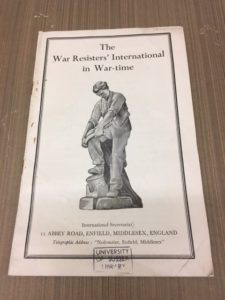
This is an example from the War category. It is a pamphlet called The War Resisters’ International in War-Time
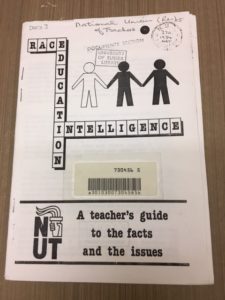
This is an example from the Trade Unions category. It is a booklet by the National Union of Teachers called Race, Education, Intelligence.
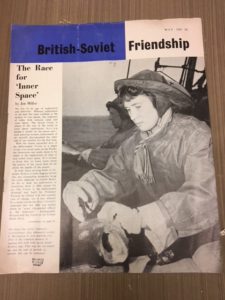
This is an example from the Social Movements category. It is a pamphlet called British-Soviet Friendship
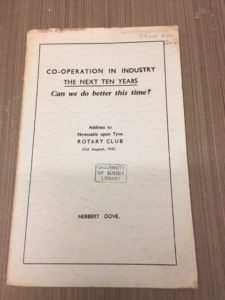
This is an example from the Post World War 2 World Order category. It is a pamphlet called Co-operation in industry, the next ten years by Herbert Dove
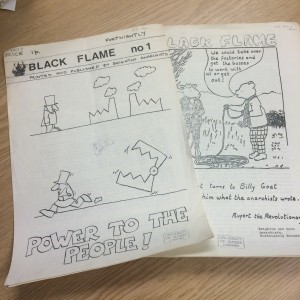
This is an example from the Popular and Counter Culture category. It is two pages of a leaflet called Black Flame
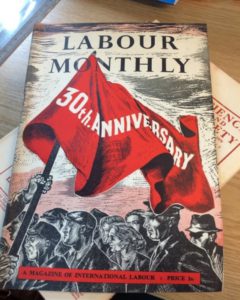
This is an example from the Political movements and parties category. It is an example of the Magazine of International Labour
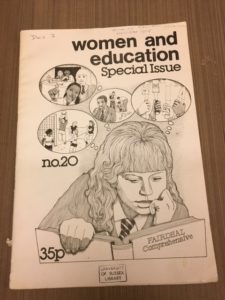
An example from the Gender Studies and Feminism category. This is a journal called Women and Education
This task has had tricky moments as we grapple with crossover publications covering Socialism in wartime or areas such as airport expansion and the market economy which we struggled to fit into our categories. We now feel the next step is to add Infrastructure and Trade to our list to cover these gaps satisfactorily.
We are almost ready to start cataloguing and the War section is looking good to start with, as the items in there are without any doubt in their right place.
Please do drop us a line if you would like to know more or be involved in the creation of Legacy:
Library.collectiondevelopment@sussex.ac.uk